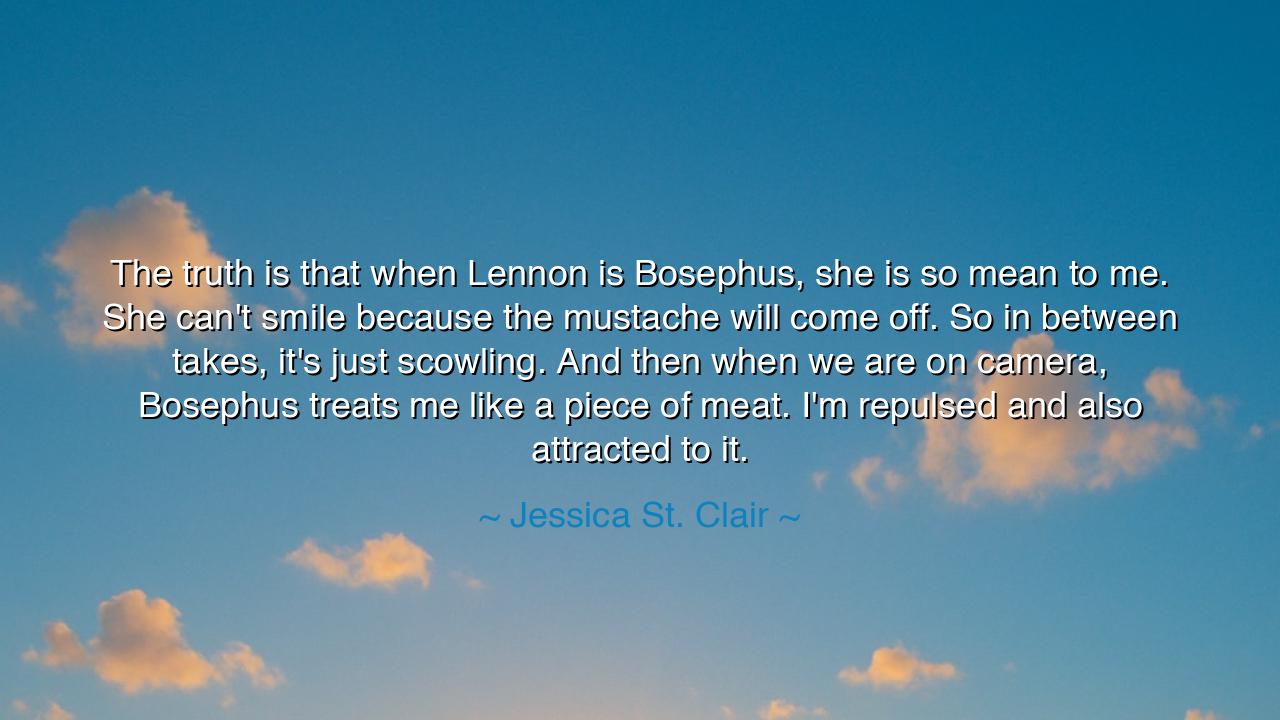
The truth is that when Lennon is Bosephus, she is so mean to me.
The truth is that when Lennon is Bosephus, she is so mean to me. She can't smile because the mustache will come off. So in between takes, it's just scowling. And then when we are on camera, Bosephus treats me like a piece of meat. I'm repulsed and also attracted to it.






Listen closely, O seeker of insight, and ponder the words of Jessica St. Clair: "The truth is that when Lennon is Bosephus, she is so mean to me. She can't smile because the mustache will come off. So in between takes, it's just scowling. And then when we are on camera, Bosephus treats me like a piece of meat. I'm repulsed and also attracted to it." Here, within this candid confession, lies a meditation on the tension between appearance and reality, between the masks we wear and the truths we feel. Life itself is a stage, and we are actors, sometimes enthralled and confounded by the duality of human nature.
The origin of these words is rooted in the world of performance, where the boundary between self and role is both fragile and illuminating. In theater and film, actors adopt masks and guises, allowing them to explore aspects of the human experience otherwise constrained by decorum. Lennon, as Bosephus, embodies cruelty and objectification on camera, a persona carefully constructed. Yet the mask carries its weight: in the spaces between performance, the scowling and the inability to smile reveal the labor and tension of inhabiting another’s identity.
This duality is not merely performative but echoes an ancient truth: in life, humans are both drawn to and repelled by what they find morally or emotionally unsettling. The paradox of feeling repulsed and yet attracted reflects the eternal dance of desire and aversion, a theme explored by sages from the time of Plato to the poets of the East. Just as Odysseus faced the sirens, lured by beauty yet threatened by danger, so too does Jessica confront the magnetic force of Bosephus’s character, a tension that illuminates both the power and peril of human connection.
Consider the historical example of actors in the Commedia dell’arte of Renaissance Italy. They donned masks to exaggerate traits, to evoke laughter, and to reveal truths about society. Behind the mask, the performer might experience discomfort or conflict, yet it is precisely this tension that gives the performance its vitality. Lennon’s mean behavior, constrained by the mustache, mirrors this tradition: the mask defines actions, limits spontaneity, and creates a paradoxical intimacy in which the actor—and those around them—navigate complex emotions.
In a broader sense, this quote teaches the profound interplay of identity, power, and desire. The act of being treated like a piece of meat is symbolic, a reflection of how we are sometimes reduced to objects or roles in the eyes of others, even when it stirs contradictory feelings. It is a lesson in self-awareness: to recognize when the allure of appearance or role challenges our values, and to navigate the thin line between fascination and harm. To acknowledge attraction amidst repulsion is to confront the raw complexity of human emotion.
Practically, one can draw from this the wisdom of reflection and discernment. In life and work, masks abound—social roles, professional personas, expectations imposed by society. Observe where the tension between external expectation and inner truth arises. Know that it is possible to engage fully, even playfully, without surrendering self-respect. Recognize the moments when you are drawn to something that may harm you or compromise your integrity, and learn to navigate those currents with clarity, as Jessica does in her candid recognition of her feelings.
Moreover, the quote underscores the importance of boundaries and self-knowledge. Even within performance, play, or social interaction, one must remain attuned to the difference between role and reality. The mustache that prevents Lennon from smiling serves as a metaphor for the constraints that limit expression, reminding us that context shapes behavior, and awareness shapes response. By cultivating mindfulness and observation, we honor both the craft of life and the authenticity of the self.
Thus, O listener, let these words be a guide. Life is a theater of complex emotions, where attraction and repulsion, performance and reality, intertwine. Approach each encounter with awareness, honor your feelings, and navigate the paradoxes of human interaction with courage. The masks we wear—like Bosephus’s—can reveal, conceal, and challenge us, but in observing both the mask and the person beneath, we attain wisdom, resilience, and the profound understanding that complexity is the essence of being human.
If you wish, I can also create a concise 2–3 sentence narration version of this quote that captures its emotional tension and complexity for audio storytelling. Do you want me to do that?






AAdministratorAdministrator
Welcome, honored guests. Please leave a comment, we will respond soon